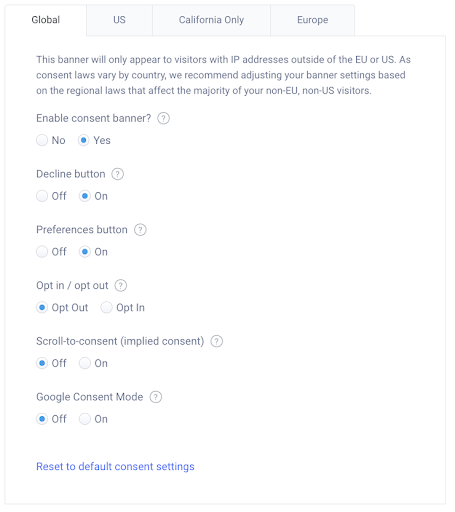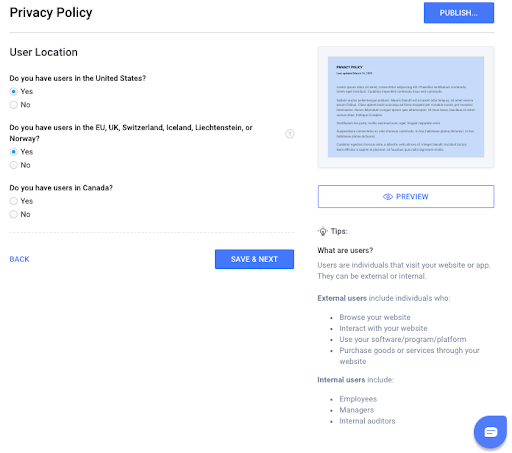Businesses process personal data from users for multiple beneficial reasons, like enhancing the customer experience, product development, and marketing research.
But, to use data sustainably, businesses must prioritize data privacy, which refers to the control people have over their data and the processing and security systems businesses implement.
In this guide, I explain what business owners need to know about data privacy, what steps to take to become a privacy-literate company, and we hear from a privacy expert who speaks on why it matters.
- What Is Data Privacy?
- What Laws Govern Data Privacy and How?
- What Are the Benefits of Complying With Data Privacy Laws?
- What Are Some Examples of Data Privacy Risks?
- How Can Businesses Protect User Privacy?
- How Does Termly Help Businesses Protect User Privacy?
- How Can Users Protect Their Online Privacy?
- Summary
What Is Data Privacy?
Data privacy, by definition, is the relationship between entities that collect, process, and use personal data and individuals’ controls and choices over how that information gets used.
Businesses that prioritize data privacy typically:
- Know about, are familiar with, and adequately follow all applicable data protection laws that apply to their business.
- Publish necessary legal policies, like privacy and cookie policies, to properly inform website visitors about their data processing activities.
- Use consent banners and Data Subject Access Request (DSAR) forms to give their users a choice over how their information gets processed.
- Implement data mapping (data inventories) so they know where all personal information they collect gets stored and who has access to it.
- Train their employees at every level, including administrators, on best practices regarding data privacy and cybersecurity.
- Have a dedicated team or employee responsible for implementing best practices regarding data privacy.
Data privacy helps ensure businesses collect, store, and process personal information safely, transparently, and honestly.
It encourages businesses to think about and build best practices for privacy in all aspects of their internal procedures from the ground up.
What Is the Difference Between Data Privacy and Security?
Technically, data privacy and data security are two distinct operations that work together to create a successful and efficient system.
While data privacy is about the personal information collected and processed about individuals, data security is about keeping that information safe from cyberattacks and unauthorized access.
For example, data privacy involves ensuring you’re adequately following all data privacy laws and setting up mechanisms of control so your consumers can follow through on their rights.
However, your data security practices should focus on safely storing the information, completing data mapping or a data inventory, having a process in place to identify and respond to a data breach, and implementing a backup or data recovery plan.
You can’t implement proper data privacy techniques without focusing on keeping the information and processing activities safe and secure.
Your business must spend time and energy focusing on both.
Why Is Data Privacy Important
Data privacy is essential because it helps businesses:
- Comply with applicable data privacy laws
- Gain and retain consumer trust
- Build effective, efficient data management practices
- Minimize risks and costs associated with data breaches
- Adapt to the ever-changing climate of the internet
- Keep up with changing and advancing technology
But, the primary reason why data privacy is important for businesses to take seriously is because it affects everyone — business owners and consumers alike.
When we spoke with Andrew Folks, CIPP/US and Westin Fellow for the IAPP, he said, “Many business owners see privacy purely as a compliance cost when it actually provides a competitive advantage.”
Businesses must respect the importance of data collection and processing to reap the benefits and improve the customer experience.
“Nearly 68% of consumers said they are concerned about their online privacy, according to the 2023 IAPP Privacy and Consumer Trust Report.” – Andrew Folks, CIPP/US and Westin Fellow for the IAPP
He adds, “As a result, privacy-conscious businesses see increased rates of consumer loyalty and return on their investment in privacy programs.”
One way to build and maintain this consumer relationship is by providing transparency, choice, and control to the people the data comes from.
How Do Fair Information Principles Influence Data Privacy?
The Fair Information Practice Principles, sometimes called FIPPS, significantly developed our modern understanding of data privacy.
Said to have first been proposed by the U.S. Department of Health, Education, and Welfare in 1973, the principles were adopted by the Organization for Economic Cooperation and Development (OECD).
The OECD is an international group that stimulates economic progress and world trade.
They reference the principles in their ‘Guidelines on the Protection of Privacy and Transborder Flows of Personal Data.’
The principles also laid the foundation for many current data protection laws, including the:
- California Consumer Privacy Act (CCPA)
- General Data Protection Regulation (GDPR)
- Personal Information Protection and Electronic Documents Act (PIPEDA)
The nine fair information practice principles are:
- Access and amendment: Entities should provide individuals with access to the personal information they collect and allow them to correct or amend the data.
- Accountability: Entities should be accountable for complying with and applying the principles and other applicable privacy-related procedures.
- Authority: Entities should only collect, use, process, or store personal information when they have the power to do so, and that authority should be clearly identified and explained to consumers.
- Minimization: Entities should only collect, use, and process information that’s directly relevant to their needs to accomplish legally authorized purposes and only maintain the data for as long as necessary to achieve those goals.
- Quality and integrity: Entities should collect, use, and store personal data with accuracy, relevance, timeliness, and completeness as necessary to ensure fairness to individuals.
- Individual participation: Entities should include the individual in the processing and use of personal information and seek their consent for using, processing, and storing their data. Entities should also establish a process for addressing privacy-related concerns.
- Purpose specification and use limitation: Entities should give a notice of the specific purposes for why they collect and use personal information and should explain as much in a notice to the individual.
- Security: Entities should establish technical, administrative, and physical safeguards to protect personal information appropriate to the risk of harm that could result in its unauthorized access, use, modification, loss, or destruction.
- Transparency: Entities should be honest about the information, policies, and practices concerning personal information.
What Laws Govern Data Privacy and How?
Several laws around the globe govern data privacy, and while they each share some similarities, they also present notable differences.
In this section, I’ll briefly identify various laws that govern data privacy and explain how they impact businesses and consumers.
General Data Protection Regulation (GDPR)
For individuals in the European Union (EU) and the European Economic Area (EEA), the GDPR governs how entities worldwide can collect, process, and use their personal information.
Specifically, it requires covered entities to:
- Provide individuals with a privacy notice stating what data you collect, why, how it’s collected, if you sell to third parties, and if you transfer it internationally.
- Provide a method so consumers can follow through on their rights to access, correct, amend, or delete their personal data.
- Give consumers a means to follow through on opt-out rights regarding specific types of data processing.
It also stipulates that businesses must follow the principle of Privacy by Design (PbD), which means building data privacy and protections into all technical systems a company uses.
The GDPR also notably relies on the FIPPs previously mentioned in this guide, making them a legal requirement.
Additionally, the United Kingdom is protected by the Data Protection Act, which is identical to the GDPR, but it accounts for the country’s separation from the rest of Europe.
California Data Privacy Laws
California passed a few laws that changed the scope of data privacy worldwide, including the:
- California Consumer Privacy Act (CCPA)
- California Privacy Rights Act (CPRA) — amends portions of the CCPA
- California Online Privacy Protection Act (CalOPPA)
The CCPA, as amended by the CPRA, is similar to the GDPR. It also grants California consumers the right to access, correct, or delete their personal information.
It provides certain opt-out rights regarding data processing for things like targeted advertising, the sale of their data, and profiling and outlines specific privacy notice guidelines.
CalOPPA, on the other hand, focuses explicitly on details that must go in a privacy policy if you operate online and collect data from California visitors.
Other US State Privacy Laws
Several other US states have passed data privacy laws that are similar to California’s CCPA, including the following:
- Colorado Privacy Act (CPA)
- Connecticut Data Privacy Act (CTDPA)
- Delaware Personal Data Privacy Act (DPDPA)
- Florida Data Privacy Bill of Rights (FDPR)
- Indiana Consumer Data Protection Act (Indiana CDPA)
- Iowa Consumer Data Protection Act (Iowa CDPA)
- Montana Consumer Data Privacy Act (MCDPA)
- Oregon Consumer Privacy Act (OCPA)
- Tennessee Information Protection Act (TIPA)
- Texas Data Privacy And Security Act (TDPSA)
- Utah Consumer Privacy Act (UCPA)
- Virginia Consumer Data Protection Act (VCDPA)
These laws allow consumers to access, delete, correct, and amend their personal information.
They also outline distinct privacy policy requirements.
Like the GDPR and the CCPA, these laws stipulate that entities should only collect personal information that is reasonably necessary for the purposes presented to the consumers.
Federal US Laws
Other laws in the U.S. impact data privacy based on who the target audience is and what industry you’re in. Those include the:
- Children’s Online Privacy Protection Act (COPPA) dictates the collection of personal information from known children and minors.
- Health Insurance Portability and Accountability Act (HIPAA) applies to health insurance data and ensures confidentiality.
- Electronic Communications Privacy Act (ECPA) explains government restrictions on wiretapping.
- Gramm Leach-Bliley Act (GLBA) instructs financial institutions on handling private information.
- Fair Credit Reporting Act (FCRA) outlines how entities can collect and use credit information.
Canadian Data Privacy Laws
In Canada, two primary data privacy laws dictate how entities collect, process, and use personal information:
PIPEDA covers specific portions of Canada, exempting areas where provincial laws supersede it, and it uses the FIPPs as the foundation for its ten fair information principles.
Quebec’s Lawe 25 covers the personal data of people in Quebec, granting them the right to access and correct their information, and outlines privacy policy requirements.
What Are the Benefits of Complying With Data Privacy Laws?
Complying with data privacy laws benefits businesses in several ways.
You’ll avoid getting fined or receiving penalties for violating the law and won’t face the public backlash and bad press that typically follows a massive data privacy fine.
Focusing on data privacy also helps your business build and retain customer trust. By proving you’re an honest and privacy-literate company, customers are more likely to trust you to handle their personal information.
You’ll limit cybersecurity risks, because training your team and having procedures in place that use data privacy best practices better prepares you to prevent and respond to cyberattacks.
Finally, it helps your business more easily adapt to new technologies.
Encouraging a company-wide awareness of how to best protect user personal data means your business can implement new technologies without compromising user data.
What Are Some Examples of Data Privacy Risks?
Some of the most common data privacy issues and risks businesses and consumers face include cybersecurity incidents, unauthorized access or data breaches, and the deletion or loss of information.
Some examples of potential data privacy risks include:
How Can Businesses Protect User Privacy?
Some of the best ways businesses can protect user privacy include employee training, implementing proper internal procedures, and adequately budgeting for safety and security.
We recommend implementing the following security measures whenever it’s appropriate for your business:
- Implement multifactor authentication for logging into important accounts, like profiles containing categories of sensitive data.
- Use strong, complex passwords internally for employees and externally if users can create accounts on your platform.
- Map the data you collect to know where it’s kept, the security measures in place, who can access it, and why your business uses it.
- Only collect and process personal data that’s necessary for the purposes you’ve presented to your users, and don’t retain it for longer than needed.
- Hold any third-party entities you work with accountable to follow the same level of data privacy protection as your company.
- Have a backup method in place for backing up and restoring data, and test it regularly.
- Use security techniques like data encryption and anonymization.
How Does Termly Help Businesses Protect User Privacy?
Termly offers policy generators, a Consent Management Platform (CMP), and other tools and resources to help businesses prioritize data privacy easily, efficiently, and affordably.
Our legal team and data privacy experts vet all our solutions, which we built to comply with data privacy laws like the GDPR, the CCPA, PIPEDA, and more.
We also update our tools regularly to account for new and changing data privacy legislation.
You can configure our CMP to present users with a consent banner featuring the appropriate opt-in or opt-out settings based on applicable regional laws.
We’ll securely store a log of your users’ consent choices, which you can access directly in your Termly Dashboard.
View an example of it below.

You can also use our Privacy Policy Generator to customize a policy that complies with several data privacy laws.
It asks simple, basic questions about your business’s data processing activities, removing all the hassles and guesswork.
See what it looks like in the screenshot below.

How Can Users Protect Their Online Privacy?
Informed data privacy consumers are better equipped to keep their personal information safe while browsing the internet.
Users can protect their privacy online by taking the following actions:
- Use complex, different passwords for your various accounts and change them regularly.
- Set up Global Privacy Controls on your preferred browser.
- Use malware tools, run scans often, and keep these tools updated.
- Familiarize yourself with common cybersecurity crimes and techniques to avoid scams.
- Don’t click on insecure email or text links.
- Utilize multifactor authentication and biometric logins when available.
- Don’t give more personal information than necessary.
- Only use reliable, trustworthy websites, apps, and platforms.
- Be aware of your privacy rights and the laws that protect them.
Summary
Data privacy should be a top priority for any business that collects, processes and uses personal information from consumers.
Businesses benefit from the collection of personal user data, and to sustainably keep using it, you must keep it out of the hands of bad actors and only use it in responsible, safe, and legally compliant ways.
Prioritize data privacy with ease by taking advantage of the compliance solutions, policy generators, and resources offered by Termly and join the millions of businesses making the internet a safer place for all of us.

